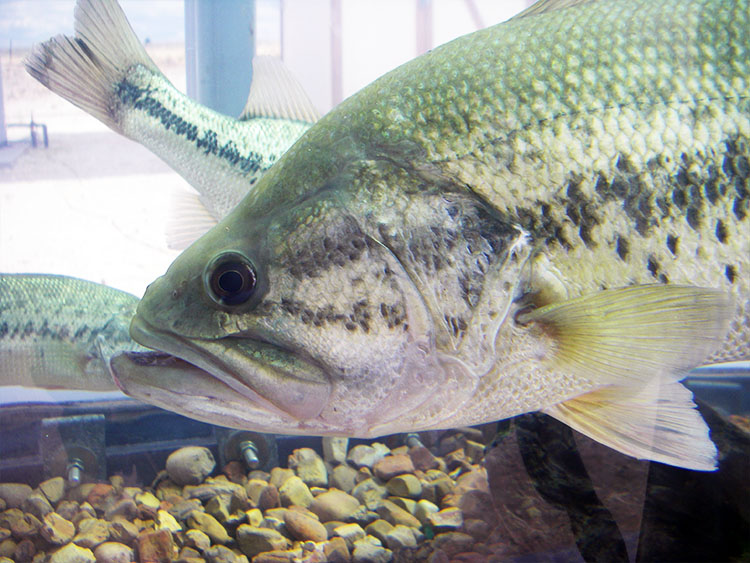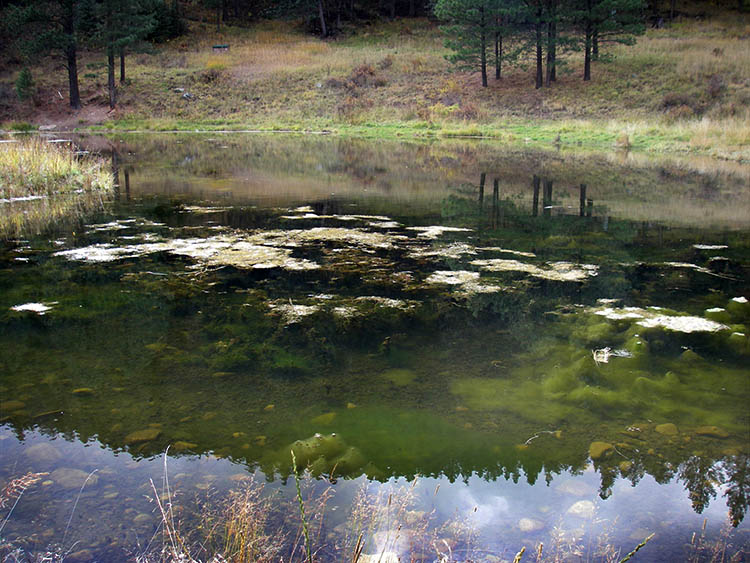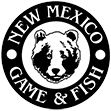Fish for Private Ponds
A Guide to Stocking and the Importation Process in New Mexico
Following is an introduction to the importation permit process. Click tab headings below for vendor lists. For fish importation applications see (Enforcement → Special Use Permits → Importation)
Introduction
The New Mexico Department of Game and Fish does not stock private ponds or lakes inaccessible to the public; however, there is a process for individuals to get fish for their private ponds and streams.
This guide explains the importation permit process and provides information on the process together with basic stocking strategies.
If you have any additional questions about the process please contact the Fisheries Management Division at:
505-476-8055.

Northern largemouth bass at NM Outdoor Expo
Steps
The following list describes the fish importation and stocking process for your private pond, lake, or stream.
Please note a permit may be denied due 1) the type of species, 2) pond inlet/outlet characteristics, 3) hydrological connection to adjacent waters, and 4) proximity to some wild or sensitive fish populations. (For example, we would deny an application to stock rainbow trout in a pond that is connected to a stream containing Rio Grande cutthroat trout. Rainbow trout can hybridize with Rio Grande cutthroat trout and the population could lose genetic integrity).
- Select fish species, number, and size. Waters in New Mexico are highly variable and can support several different fresh water fish species, (depending on water characteristics: temperature, water quality, available food, depths, etc.). Trout, such as rainbow trout, need cold water and will die in water warmer than 70˚F. Alternatively, species such as bass and catfish will not grow or survive well in extremely cold high-elevation waters. Selecting the appropriate size of fish is just as important as the species. If you want to stock trout and would like to catch them immediately, then stock catchable (>10 inches) sized trout. If your pond has an ample food source (e.g., aquatic bugs, minnows, etc.) and habitat (e.g., suitable water quality year round) then you can stock fingerling (3 to 5 inches) sized fish. The advantage of stocking smaller fish is they are typically less expensive.
- Select an approved fish supplier/vendor. Fish must be purchased from an approved and disease free vendor to be imported into NM. For a list of current approved fish vendors click the appropriate vendor type (from tabs found on this page).
- Complete the importation application. An importation permit will be required prior to bringing any fish into NM. The actual importer (person bringing the fish into NM, typically the vendor) is the person that needs the permit. To expedite the process, the pond owner should fill out as much information as possible on the application. The fish importation application can be found on the New Mexico Department of Game and Fish website under: Enforcement → Special Use Permits → Importation → Fish or Fish-Eggs Importation Application. Incomplete applications will be rejected and returned to the applicant.
Once the Department receives the application it will be reviewed and processed. If grass carp are listed on the permit, or if there are concerns about effects to wild fish populations from the stocking, then a pond visit may be required. The pond visit will be conducted by Department personnel. During the visit Department personnel will inspect the inlet(s) and outlet(s) to identify potential escape routes, or assess any risk to wild fish populations. The Department may make recommendations for preventing fish escape routes, such as screening, prior to approving the application. If a pond visit is required, Department personnel will contact the pond owner to set up an appointment. It is important to list an updated phone number for the pond owner (or care taker) on the application so that an appointment can be made.
Triploid Grass Carp & Controlling Aquatic Infestation

Aquatic vegetation infestation at Cowles Ponds.
Controlling aquatic vegetation in ponds and lakes is important to maintain a healthy ecosystem. Aquatic vegetation is vital for 1) providing habitat for bugs (fish food), 2) shading adult fish, 3) creating hiding areas for juvenile fish, 4) stabilizing substrate materials, and 5) producing oxygen. If vegetation becomes too dense it causes several issues such as limiting fishing and boating access, and this can cause fish kills. During summer months, living aquatic vegetation produces oxygen; during late fall and winter, dying plants consume oxygen as they decompose. Sometimes the decomposition process consumes so much oxygen it causes fish kills, so it is critical to find the proper balance of vegetation density.
There are three main methods available for controlling aquatic vegetation: mechanical, chemical and biological. All three methods have advantages and disadvantages.
- Mechanical removal involves devices such as weed rakes, aquatic mowers, and tractors to grab and pull vegetation from the water. Typically this method is cost effective but very labor intensive and needs to be conducted continuously through a growing season.
- Chemical removal involves application of an aquatic herbicide or UV-blocking dye. Herbicide and dye can be very effective at removing and controlling vegetation but can be expensive, and typically need multiple applications in a growing season.
- The last method is biological control by stocking triploid grass carp. Grass carp are an herbivorous fish that consume large quantities of aquatic vegetation each day. Stocking triploid grass carp can be initially expensive, but in the long run are more cost efficient than other methods. This method is also not labor intensive since the fish do the work for you.
Only certified triploid (sterile) grass carp are approved to be imported into New Mexico. Stocking triploid fish ensures the grass carp will not reproduce and become overpopulated and invasive. This allows the pond owner to control the number of grass carp in their pond and give some assurance they will not expand and populate other waters.
It is important to stock the appropriate number of grass carp since you only want to control and not completely eliminate the vegetation. Below are recommended grass carp stocking rates per surface acre based upon elevation and vegetation coverage:

Department biologist holding a large grass carp from Quemado Lake.
| Elevation (ft) | Vegetation Density | |||
| <20% | 20-40% | 40-60% | >60% | |
| <5,000 | 0 | 3 | 5 | 7 |
| 5,000-7,000 | 0 | 4 | 7 | 10 |
| >7,000 | 0 | 5 | 10 | 15 |
These are only recommended rates and adjustments should be made for extreme vegetation densities and control level desired.
Stocking Private Ponds in the San Juan River Basin
In order to reduce potential negative effects of non-native species on federally listed fish species in the San Juan River Basin, the New Mexico Department of Game and Fish has established conditions that must be met before an importation permit will be approved. The conditions are mostly related to pond characteristics to reduce fish escapement risks. For more information please see Stocking Private Ponds located within San Juan River Basin.
